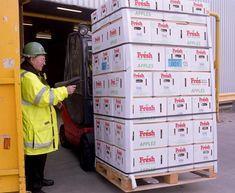
A European Commission committee has agreed to implement import licences for all apples from third countries into the EU from February 1 for a two-year period.
However, the move has worried some in the industry: “The introduction of import licences goes against our principle of free trade,” said Philippe Binard, delegate-general of European trade association Freshfel. “The situation needs to be viewed as a whole in order to return profitability to the European apple sector through increasing exports, consumption and quality.
“We believe import licences should only be a temporary measure and that it should not set a precedent.”
Rather than to regulate the market, the intention of the licences is to monitor volumes arriving in the EU, following problems with slow and inaccurate reporting of data by customs authorities in several member states last year.
But the New Zealand sector is not impressed. “We are not in the least bit happy,” Peter Beaven chief executive of Pipfruit New Zealand told FPJ. “Through the Southern Hemisphere Association of Fresh Fruit Exporters a lot of the information is already available to the EU authorities so there is no need for extra monitoring systems to be introduced for southern-hemisphere sendings. The other thing that concerns us is if that information is going to be used to activate trigger volumes provided for in the safeguard clause and lead to the introduction of punitive tariffs.”
But Freshfel’s understanding from the Commission is that is unlikely. “A number of factors have to be present to activate the hitherto never-used safeguard clause introduced in 1996,” said a spokeswoman for the association. “Only if volume set for a period is exceeded and standard import values are at least eight per cent below the entry price, does the Commission even have the possibility to impose any additional duty. And then it would be on a country-by-country basis not one blanket trigger volume for all countries.”
Licences must be applied for through the Rural Payments Agency in the UK - on a shipment by shipment basis at a cost of €15 a tonne. This sum is then reimbursed once the licence is used.



